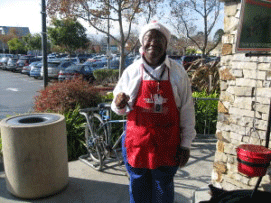Listen to this article
Listen to this article
Loading
Play
Pause
Options
0:00
-:--
1x
Playback Speed- 0.5
- 0.6
- 0.7
- 0.8
- 0.9
- 1
- 1.1
- 1.2
- 1.3
- 1.5
- 2
Audio Language
- English
- French
- German
- Italian
- Spanish
Open text
tips for recruiting those in recovery. by glen doss, major –. “lt. colonel lois allen profoundly touched my life. consequently, i became a salvation army soldier,” declares ed holmes, a 2001 adult rehabilitation center (arc) alumnus. “it was after major darren trimmer went out of his way to accompany me to court that i committed to becoming a soldier,” declares glen chase, a 2012 arc alumnus. this list could go on and on. as part of the arc family for over 20 years—first as an administrator, then as a chaplain—i have long heard the stories of arc beneficiaries and alumni and i’ve found a common thread. generally, it was after a salvationist showed an active interest in an individual’s life that he or she became a soldier. i realize you may be thinking this is nothing new, that personal contact has always been a key to recruiting church members. i agree, but for an arc beneficiary it is imperative. often, the beneficiary is fragile and self-esteem low as he or she begins recovery from drug or alcohol addiction. the addiction that once fabricated self-confidence became a trap in a dangerous lifestyle. reaching out to these individuals is certainly included in jesus’ mandate to “go and make disciples of all nations” (matt. 28:19), but it requires people touching people. these suggestions may help:. try to include people in recovery in conversation. if you take the time to ensure they are included, they will likely gain confidence. really listen to them. allow them to express themselves by giving them your complete attention while they are addressing you. this will send the message that their opinions matter, that their concerns are important enough to be given full attention and understood. be compassionate and gentle. people in recovery are sometimes on the defensive or may seem to be in a bad mood. take it with a grain of salt: they have likely taken an emotional beating from themselves and those around them and feel quite badly. be careful what you say. people in recovery are sensitive and vulnerable. where one person might shrug off a side remark, one with low self-esteem may internalize it and crumble from the inside. give them frequent positive feedback. remind them of their strengths, accomplishments and assets. express concern. tell them that you care. people in recovery need to be reminded that others care about them. encourage them. applaud success and even failed attempts. encouragement can mean everything to a person. take care not to make jokes that could be taken offensively. it could hurt more than you think. don’t baby them. there is a fine line between being nice and laying it on too thick. if you are too nice all of the time, they may either get offended or feel uncomfortable. be sure to be nice, but just take it easy. laugh with them, not at them. help people in recovery to laugh at their mistakes (and even your own) by trying to find some humor when appropriate. over the years i’ve led many funerals of people who died young as a result of their addictions. meanwhile, i continue to applaud the great numbers who succeed. just yesterday, i received a message that read in part: “today the lord has blessed me with 18 months clean and sober. thank you for helping me in my walk with the lord.” he wanted me to encourage him, and so i did. you can do the same.
Open context player
Close context player
Plays:-Audio plays count
tips for recruiting those in recovery. by glen doss, major –. “lt. colonel lois allen profoundly touched my life. consequently, i became a salvation army soldier,” declares ed holmes, a 2001 adult rehabilitation center (arc) alumnus. “it was after major darren trimmer went out of his way to accompany me to court that i committed to becoming a soldier,” declares glen chase, a 2012 arc alumnus. this list could go on and on. as part of the arc family for over 20 years—first as an administrator, then as a chaplain—i have long heard the stories of arc beneficiaries and alumni and i’ve found a common thread. generally, it was after a salvationist showed an active interest in an individual’s life that he or she became a soldier. i realize you may be thinking this is nothing new, that personal contact has always been a key to recruiting church members. i agree, but for an arc beneficiary it is imperative. often, the beneficiary is fragile and self-esteem low as he or she begins recovery from drug or alcohol addiction. the addiction that once fabricated self-confidence became a trap in a dangerous lifestyle. reaching out to these individuals is certainly included in jesus’ mandate to “go and make disciples of all nations” (matt. 28:19), but it requires people touching people. these suggestions may help:. try to include people in recovery in conversation. if you take the time to ensure they are included, they will likely gain confidence. really listen to them. allow them to express themselves by giving them your complete attention while they are addressing you. this will send the message that their opinions matter, that their concerns are important enough to be given full attention and understood. be compassionate and gentle. people in recovery are sometimes on the defensive or may seem to be in a bad mood. take it with a grain of salt: they have likely taken an emotional beating from themselves and those around them and feel quite badly. be careful what you say. people in recovery are sensitive and vulnerable. where one person might shrug off a side remark, one with low self-esteem may internalize it and crumble from the inside. give them frequent positive feedback. remind them of their strengths, accomplishments and assets. express concern. tell them that you care. people in recovery need to be reminded that others care about them. encourage them. applaud success and even failed attempts. encouragement can mean everything to a person. take care not to make jokes that could be taken offensively. it could hurt more than you think. don’t baby them. there is a fine line between being nice and laying it on too thick. if you are too nice all of the time, they may either get offended or feel uncomfortable. be sure to be nice, but just take it easy. laugh with them, not at them. help people in recovery to laugh at their mistakes (and even your own) by trying to find some humor when appropriate. over the years i’ve led many funerals of people who died young as a result of their addictions. meanwhile, i continue to applaud the great numbers who succeed. just yesterday, i received a message that read in part: “today the lord has blessed me with 18 months clean and sober. thank you for helping me in my walk with the lord.” he wanted me to encourage him, and so i did. you can do the same.
Listen to this article















